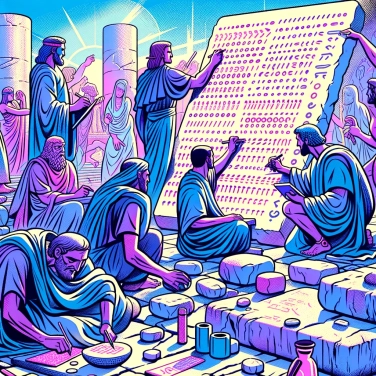Ancient civilizations used cryptic writings to protect sensitive information such as military secrets, religious practices, or valuable knowledge, and to restrict access to this information to a select group of initiated individuals.

Ancient civilizations often viewed religious knowledge as precious and dangerous if it fell into the wrong hands. Priests and initiates wrote with strange symbols or coded scripts to ensure that only certain chosen ones could grasp their mysteries. Sacred rituals, the secret names of gods, magical formulas, or initiation ceremonies were protected by these complex codes. Ancient Egypt, for example, sometimes used special hieroglyphs reserved for priests. The same was true for Mesoamerican or Sumerian peoples who guarded certain aspects of their worship jealously, accessible only to a select few initiates.
In several ancient civilizations, using a complex or cryptic writing system allowed individuals to mark a higher social status. Those capable of deciphering or using this writing had a particular role in society, such as priests, scribes, or the ruling elite. Knowing this writing meant belonging to a select circle, a sort of private club reserved only for the initiated. Consequently, showcasing this skill helped to impose respect, authority, but also a certain social prestige. It was an effective way to clearly remind everyone who held the knowledge and, consequently, the power.
In ancient societies, certain knowledge was precious, such as medicine, astronomy, or metallurgy. There was no question of letting just anyone get their hands on it! As a result, this knowledge was often expressed through symbols or coded texts that only the initiated could understand. This allowed specialists to keep their know-how protected and intact, passing it on only to those deemed worthy or competent. It was a bit like your teacher writing down their personal tips in a secret code to prevent anyone from stealing their best tricks. This practice also prevented unqualified individuals from mishandling this specialized knowledge.
Some ancient civilizations wanted to ensure that their beliefs, stories, or rituals were not misappropriated or misinterpreted by neighboring peoples. By making their writings intentionally complex and cryptic, they limited understanding to only the members of their community. This allowed them to maintain what one might call a kind of cultural barrier, thus avoiding undesirable external influences or forced assimilation. Essentially, they protected their cultural identity by obscuring the understanding of outsiders.
The Mayans sometimes developed their inscriptions to be deliberately ambiguous, using symbols with multiple meanings to adapt their message to different recipients depending on the political or religious context.
The famous Rosetta Stone, discovered in 1799 by Napoleon's soldiers in Egypt, is inscribed in three different scripts (hieroglyphs, demotic, and ancient Greek). It is this multilingual feature that has allowed us to unravel the mystery of ancient Egyptian writings.
The ancient Greeks sometimes used wax-covered tablets called 'Polybius wax tablets' to secretly convey military messages, marking one of the earliest documented uses of military cryptography.
In ancient civilizations, certain encrypted texts were not meant to be read but rather recited from memory. The cryptic symbols served as memory aids for priests and spiritual guides during ceremonies.
Sure! Here’s the translation: "Yes, several ancient scripts remain partially or completely undeciphered, such as Linear A from Crete or the writing of the Indus Valley civilization. Researchers continue to work on their decoding, hoping to one day uncover their mysteries."
A cryptic writing is often deliberately obscure or coded, used to preserve secrets or limit accessibility, while an alphabetical writing is designed to be clear and systematic to facilitate everyday communication between individuals.
In the majority of cases, yes. The use of cryptic writings was generally limited to the ruling classes, priests, scribes, or specialists in certain fields such as medicine or alchemy. This reinforced their social position and authority while protecting their unique status within the civilization.
They primarily recorded information considered sacred, spiritual, or esoteric. But they also documented particularly valuable medical, technical, or astral knowledge that they wished to protect from public access or potential invaders.
Ancient civilizations used complex symbols, obscure hieroglyphs, or coded writing systems, possessing decoding keys known only to a select few insiders. This ensured that sensitive knowledge, whether religious or scientific, was accessible only to authorized individuals.

No one has answered this quiz yet, be the first!' :-)
Question 1/5